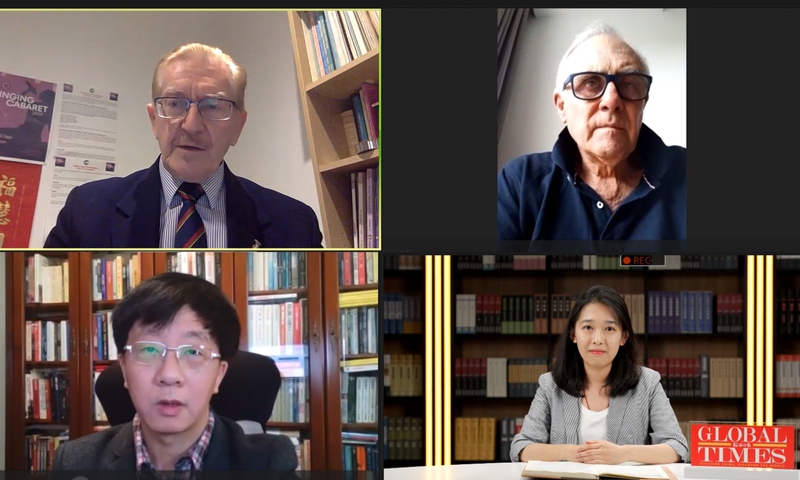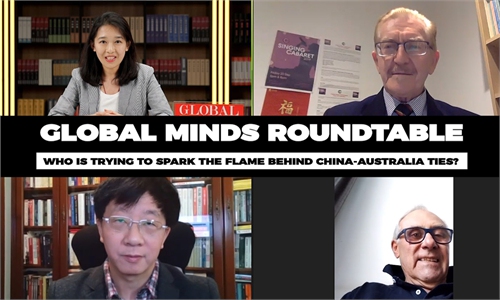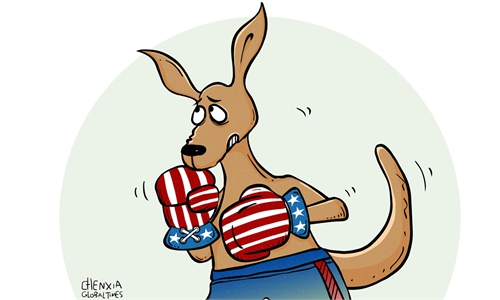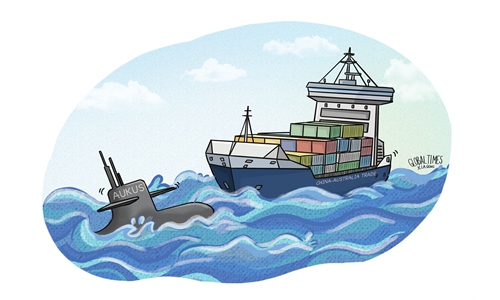
Former Australian diplomats John Lander (top left), Bruce Haigh (top right), Chen Hong (bottom-left), president of the Chinese Association of Australian Studies and director of the Australian Studies Centre at East China Normal University, discuss about China-Australia relations during Global Minds Roundtable on March 6.
Editor's Note:Just as years of freezing China-Australia ties have started to warm up with high-level talks and trade resuming and the current Australian government dialing down the volume of hawkish rhetoric, the Australian media are now beating the drums of war against China harder. Who is fanning the flames behind the scene? How did the bilateral relationship come to where it is today? And where are the relations heading? John Lander (Lander), former deputy ambassador to China, Bruce Haigh (Haigh), former Australian diplomat, and Chen Hong (Chen), president of the Chinese Association of Australian Studies, professor and director of Australian Studies Centre, East China Normal University, shared their views at Global Times' Global Minds Roundtable (GT).
GT: 2017 was considered a watershed year for China-Australia relations. Why?
Lander: 2017 was when then prime minister Malcolm Turnbull introduced the foreign interference laws, which were fairly clearly directed at supposed interference by China in Australia's political affairs. It was driven mainly by a change, I believe, in the US attitude toward China at that time.
In 2011, president Barack Obama visited Australia and announced the "Pivot to Asia" in response to what the US is continually calling the "threat" from China. Since that time, the US has influenced, particularly Australian mainstream media, to drive a hostile attitude toward China, despite the Australian desire to continue to develop and expand our bilateral trade relationship, which has been beneficial to the Australian economy and to the prosperity of its people.
I characterize the relationship, since then, as dichotomous or paradoxical, it basically boils down to Australia insisting that we must eventually go to war against China in order to protect our trade with China, which is an obvious absurdity.
Haigh: This is a complex question which goes to the heart of Australian politics. We have an alliance and arrangement with US, which is immature, and which makes us psychologically, emotionally and intellectually depend upon the US.
It's really strange for Australia to agree with the US that China is our potential enemy when it's also our biggest trading partner. There're factors that are feeding into this: the Murdoch press in Australia, the collapse of what we call the mainstream media, the move to the right by other outlets, what you might call more liberal outlets such as the ABC. It's been a concerted move.
Chen: Indeed, everything started from Canberra in 2017. And 2017 was the year Donald trump took office. The Trump administration had been pushing forward the Indo-Pacific Strategy with the unveiled aim to deter and impede China's peaceful development. We regret to see that Australia had been tailing behind Washington to act as an eager pioneer of the US' anti-China strategy.
GT: Australian media are constantly hinting a war with China. For example, Sky News Australia, owned by Rupert Murdoch, released a special episode "Are we ready for war?" in February. Which force exactly is fanning the flame?
Lander: Rupert Murdoch represents one of the great pillars of the Western and particularly US capitalism. He is a right-wing capitalist. He is now a US citizen. And he's very much tied up with the permanent establishment in Washington that rotates from one administration to another, which has been driving the US military policy for many years.
Chen: According to my observation, there's a kind of so-called modus operandi for the Cold War warriors, scare-mongers, when they try to push for some particular anti-China acts or policies.
ASPI has become almost the only cited source to comment on affairs related to China in the Australian media sphere. The media and some so-called experts work together in concerted efforts to mislead the public. Then there would be a poll for public opinion. Very naturally with the misinformation, the public opinion will be very negative. Then they would cite the poll results and say: See? The Australian public has a negative opinion about China. And with that, they will then push for changes to the policies or some new policies which would be very hostile [to China].
It's all about propaganda. The Nazi propagandist Joseph Goebbels once said,"Repeat a lie often enough and it becomes the truth." And that's exactly what those right-wing media outlets have been doing.
Haigh: You've got to admire China for its forbearance in seeking to maintain the relationship in the face of what is a rather puerile response on the part of Australian policymakers.
In terms of the pressure now that the US is applying on the rest of the world, the demonization of China is visible for all to see, particularly for those who studied history. We can see this terrible move that's underway. It's heartbreaking. For me, it's totally distressing. I feel powerless. I have written most of my life. And I feel that all that I've written is just so much sand through my fingers that it amounts to naught. No one is listening. A forum like this is very heartening, because to get with like-minded people is very good, but I can't see where the leverage is going to come on Australia. We don't have an opposition in Australia. It's collapsed. And that's because of the nature of the corruption that the liberal national party represents.
There's nobody holding a mirror up to the government in Australia. Media in Australia is not holding a mirror up to the government.
The whole of north of Australia has now been militarized. There's a [US] command center in Darwin and it's growing. It will want to know all shipping and air movements into Australian waters in a circle that's drawn by the US. The whole debate, the whole scrapping of the French nuclear dealis a charade. It's a smokescreen for getting the US submarines into Australia. The Americans didn't want the French in the pacific, building up their own scenarios for future conflict. They did not want the French there, and they wanted them out.
Americans want to get their vessels in here. They're getting their aircraft in here. They'll get other ships in here. We're just seeing the militarization of the north of Australia, and not even slowly.
GT: Could Australia stay away from getting involved in a possible US-led military confrontation with China?
Lander: I have a slightly different view than most Australian analysts, who talk about US dragging Australia into war against China, that Australia would inevitably be affected by a US war against China. The integration of the US forces into the Australian defense force is a sign that the US is going to implement its stated policy of confronting its nuclear-powered adversaries by proxy. The US is not preparing to go to war against China. The US is preparing Australia to go to war against China. The US would always stand by Australia, because Australia has always stood by the US in all of its conflicts, all around the world, Vietnam, Iraq, Afghanistan, etc.
Australia mistakenly believes that US will always protect Australia, whereas the ANZUS treaty provides no such guarantee. The US has always made it very clear that it would not protect Australia, that it would ensure that Australia has the means to defend itself.
Australia's Defence Minister Richard Marles has very proudly stated in Washington that the US forces are now interchangeable with Australian forces. That means everything the US is implanting in Australia's north, in the militarization of Australia's north, the B-52 bombers, the marines, the US vessels of various lines in a conflict, would simply be characterized as part of the Australian defense force. And it would be Australia who is at war, while the US supports Australia and US own forces will not technically engage in the war. This is exactly what they're doing in Ukraine.
Haigh: I was conscripted and went into the military, and I come from a military background. I understand their mentality. I think what's happening now inside the Australian military is they have psychologically and mentally handed over to the US.
What's happening gives them a framework. They're working toward something, and that is to contain China. It's the psychology of the military. Our military is really poorly led. We've had some poor promotions to top leadership in Australia. They're just as susceptible to American pressure as the political process is.
Chen: The reason behind proxy war is the decline of the US. Since the Trump administration and now the Biden administration, they have been strategically working at enlisting other countries, the so-called allies and partners, to join the US campaign against China. The US has been declining as a global hegemony.
Lander: My American friends say there is no control at all over the military industrial complex, which is what they are equally concerned about.
It is this relentless drive to continual warfare to enrich a very small group of powerful oligarchs in the political system of the US that is why the US internally is declining. The life expectancy in the US has gone down, while at the same time life expectancy in China has gone up. The average life expectancy in China is now higher than that in the US. The wealth gap between the richest and the poorest in the US is forever widening.
So we also have the worrying factor of jealousy. What drives a lot of the attitude in the US toward China is simply envy that China is doing better than the US. That cannot be allowed because the US is the supreme exceptional nation to be shown up by another country that is totally unacceptable to particularly the policymakers in Washington. There are many signs that the general population in the US is opposed to war, but they feel just as powerless as we here in Australia do, there seems to be nothing we can do about it.
Something will crack at some point. I'm hoping that at least in Australia that will happen before any war starts. People keep on saying a war against China might break out as though it's something like an earthquake, a flood or a landslide that just happens. But war occurs by decisions that are taken by humans. It is equally possible for humans to decide not to go to war as it is to decide to go to war. I'm personally extremely grateful that up till now, China has decided not to go to war.
My perception of China's policies with regard to the military is that it is entirely a defensive posture. It is focused on the defense of China's sovereign territorial integrity. It is not focused on the building of expeditionary forces, which is the exact opposite of US' approach that is entirely focused on expeditionary forces to conduct war in other parts of the world.
To some extent, the alliance with the US would mean less to us in the future than it has in the past, and that Australia should formulate independent policies based on Australia's own interests, and those of our nearest neighbors, that is clearly not happening.
The American military analyst Scott Ritter recently said, Australia is allegedly a sovereign nation. It should act like one and act in its own interests. China is not Japan knocking at Australia's door to invade Australia, China is knocking at Australia's door to provide economic opportunity and prosperity. The US is not offering that, the US is offering death and destruction. If Australia cannot act as an independent sovereign nation, it should pull down its flag, kick out the queen or now the king, and acknowledge its status as a colony of the US. That's what Scott Ritter said. That's the opinion of an American military analyst.
Haigh: The thing that comes now is interchangeability. We don't have to have our own gear. The US will say that they're leasing, supplying, lending, whatever the word is, stuff to Australia, that they are assisting in terms of operating some of this equipment. It'll even have kangaroos on the side. It'll look very Australian, but it might not be Australian and it'll be American, as Australia will be acting as a surrogate.
And the Australian public service is not functioning. It goes into defense expenditure where the Americans tell us what to buy. We bought 135 Abrams tanks, which apparently we don't need, but nonetheless, who decided that we needed them? It was the American industrial military machine, and we just rubber stamped it at $3.5 billion. We're not doing any of our own thinking.
GT: Let's talk about the recent positive signs in China-Australia ties.
Lander: I think the most important one has actually been the talks between trade ministers. I particularly like the fact that both sides indicated that they wished to resolve these trade matters bilaterally, rather than through the WTO and I am still reasonably hopeful that China will see its way to resolving these issues. The resumption of the imports of coal, is a very significant step. I think in the improvement in trade in some of the other areas which affect the small people in Australia, like the lobster fisherman and the Barley growers and so on, will also help attenuate the attitudes toward China.
Haigh: In all of our discussion today and all of everything, what is happening is that China is being handed responsibility on a whole range of issues. It has taken responsibility for the relationship with Australia. On a whole range of issues, China, whether it's reluctant to do so or whether it wants to do so, nonetheless, it's being forced to become the responsible power, because the US is showing itself to be the irresponsible power and incapable of making decisions that will benefit humanity broadly. There's not one thing that the US is doing at the moment that looks like it will be of any assistance to humanity. I think it doesn't go unnoticed - the US is all about its own interests. I think that China is going to have to pick up the world leadership mantle.
GT: Apart from economic and trade factors, are there other mutually beneficial fields in China-Australia ties?
Haigh: Students and tourism. Tourism under the current circumstances is difficult. Not as many as before, but a lot of Chinese students still want to come to Australia. Then you've got over 1 million Australians who can trace their families and familial ties back to China. That's a big binding factor in the relationship. Those sorts of ties are growing, not decreasing.
Chen: When we talk about economic cooperation between China and Australia, we would simply be thinking of trade, in particular with China as Australia's biggest market.
But economic ties should be mutually beneficial. From the onset, Chinese investments in Australia have been encountering political hindrance. A proposal from a Chinese business to increase its share in an Australian lithium company was rejected. There have been numerous other cases of the same nature. Mostly, these proposals and bids are being rejected on the far-fetched ground of the so-called national security. It's unfair because when the Australian media and some politicians complain about Chinese anti-dumping and anti-subsidy duties imposed on Australian wine, they forget that there have also been, as I remember, 106 cases of anti-dumping investigation on Chinese businesses. But China lodged only four against Australian goods. So this unfairness is simply frustrating to create a favorable atmosphere of economic and trade and investment cooperation. The cooperation needs to be mutual. It's not simply one side benefiting from this relationship.
GT: Since the two trade ministers and the foreign ministers have met. Shall we say that China and Australia may be reaching a new starting point for further improvement of relations?
Chen: We can't deny the fact that Australia will continue to position its alliance with the US as the basis for its foreign, security policies and strategies. But emotional and traditional or cultural attachments should not override Australia's own national interest. Australia's leaders and decision-makers need to be clear-minded to know that in the same way, it is not in China's interest to harm Australia's interests. Likewise, it is not in Australia's interest to position China as an enemy. It's logically incorrect and strategically wrong. The balanced relations have suffered tremendous damage during the past five years, but I don't think the damage is beyond repair.
Haigh: There's a lot of potential goodwill. There are a lot of ifs. If the media in Australia turned around and became positive, if the mindset among Australian leaders changed, then the relationship would take off. There's so much potential in our relationship with China in terms of cultural, scientific, medical exchanges. It's just a wealth of stuff out there waiting to be tapped into, to be developed.
The potential for Australia to establish a close relationship with China is enormous, but people here are small-minded and fearful. They're letting this slip through their fingers. I would love to be more optimistic than I am at the moment. It's not my nature to be pessimistic. But just looking at the way things are lined up, it's not looking good. On the personal basis, Chinese are wonderful people. I've got some great friends in China. That's where the potential is in the future.
GT: Are there ways to remove disruptive factors in the improvement of the China-Australia bilateral relationship?
Haigh: In terms of what we've already discussed, it requires the mindset in Australia to change. It requires the mindset of media and the government to change, and then the people will follow. Academic institutions in Australia are keen that this should occur, but it does require a quite fundamental shift in mindset.
Chen: Confucius institutes have been unfairly and regretfully demonized by some anti-China elements in Australia. That is not helpful and unfair to foster positive exchanges and cooperation between the two countries. Usually we say, from small things, big things grow. I believe both countries need to encourage and promote interest in each other to foster literacy and familiarization of each other's culture, politics and societies. That's one thing I believe we need to do at this critical time for the bilateral relations.



